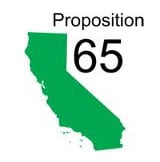The legislation (AB 227), penned by Assemblyman Mike Gatto (D-Los Angeles), would amend the Health and Safety Code to help protect firms from opportunistic plaintiffs using Prop 65 as a money-making exercise, said Gatto.
What is Prop 65?

Introduced in 1986, Prop 65 requires manufacturers selling products in California to give warnings if their products expose consumers to any detectable amount of more than 800 chemicals believed to cause cancer or reproductive toxicity.
While it has the laudable aim of protecting consumers from potential carcinogens, it has in practice exposed even the most responsible firms to the constant threat of litigation, claimed Gatto.
Although ‘safe harbor’ thresholds have been set for about a third of the chemicals covered by Prop 65, all plaintiffs have to do in the case of the other substances, is show that a detectable amount is in the targeted product.
After that, the burden of proof is entirely on defendants to prove that this level is safe – with all the associated costs – or apply a label saying the product contains chemicals ‘known to the State of California to cause cancer and birth defects or other reproductive harm’.
Many of these lawsuits never get to a courtroom
“Unfortunately, there have been some who have taken advantage of provisions in the proposition to ensnare businesses in lawsuits, with the hope of obtaining settlement payments that were never contemplated by the voters when they passed Prop. 65”, claimed Gatto.
“Many of these lawsuits never get to a courtroom. They are settled out of court, sometimes for tens of thousands of dollars, because business owners do not have the means to hire attorneys, and fear becoming entangled in protracted civil proceedings that could result in significant damages and attorney’s fees.
“AB 227 will return Prop. 65 to what voters intended it to do: Punish violators who pollute our state’s waterways or expose workers to dangerous carcinogens and to inform consumers of the risks in the products they may purchase.”
Under Gatto's proposal - which will be assigned to a policy committee for further deliberation next month - businesses would be given 14 days to comply with a Prop 65 notice by posting Prop. 65 warnings, he said. If they can, they would be safe from further legal action and would not face exorbitant retrospective fines.
“Such suits exist because the law allows for fines of $2,500 per day, enforced by any plaintiff", he claimed. "Most people suing businesses expect that a small business, wary of litigation costs, will opt for a quick settlement to make the lawsuit go away.”
AHPA: All in all, this is a step in the right direction
Michael McGuffin, president of the American Herbal Products Association, said he welcomed Gatto's proposal, although he had some concerns.
“For example, while corrections of violations within 14 days may work at a coffee shop, where all of the goods are on the premises, it may be difficult to achieve for products that are at various stages of distribution throughout the state.
“Also, I have some concern that the attorney general and city or district attorneys may not readily "concur" that a violation has been corrected.”
But he added: “These are trifles that can be worked out through the legislative process. All in all, this is a step in the right direction, and would transform enforcement of Proposition 65 into a process that would better encourage compliance.”
ANH-USA: The law is being significantly abused
Although defendants may make ‘payments in lieu of civil penalties’ for activities that limit toxic exposure, in practice, these are often made to the very parties bringing the suits - and used to fund new Prop 65 claims, according to the Alliance for Natural Health USA.
Speaking to us last year, executive director Gretchen DuBeau said the costs of proving that the amount of a Prop 65 substance you are potentially exposing consumers to is safe were often prohibitive given the lack of clear safety thresholds.
While firms should protect themselves by applying rigorous checks throughout their supply chains and routinely testing for substances most commonly cited in prop 65 claims (lead, pcbs, arsenic), there is only so much you can do, she said.
“We believe the law is being significantly abused and we’d like to see a new proposition on the ballot to replace Prop 65 in 2014.”
Who is liable?
Meanwhile, just because small companies with fewer than 10 employees are exempt from Prop 65, doesn’t mean they are not affected, as they frequently supply manufacturers or retailers with more than 10 staff, who are not exempt, said DeBeau.
“A retailer with 50 staff might say to the small supplier, I’m not stocking your products unless you can indemnify us.”
